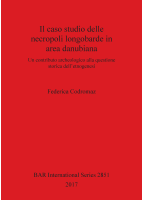Description
Questo libro, basato sulla tesi dottorale dell’autrice, si focalizza sulle tradizioni funerarie e sulla società longobarda nell’ultima fase della migrazione. Le numerose teorie riguardanti identità ed etnogenesi, nate e sviluppatesi in ambito storico, hanno trovato impiego in campo archeologico: è in quest’ottica che la documentazione funeraria ha un carattere privilegiato, perché l’evidenza delle necropoli è la più ricca e la meglio conservata per buona parte dell’età delle migrazioni. L’analisi dei contesti funerari di 16 necropoli austriache ed ungheresi di cultura Longobarda ha fornito interessanti risultati riguardo la cultura e la società che ha composto quei corredi. L’approccio impiegato ha permesso di individuare numerosi elementi, dai quali sembra possibile trarre alcune valutazioni delle caratteristiche sociali, cultuali e culturali dei Longobardi in Pannonia, permettendo in questo modo di definire alcune caratteristiche della loro etnogenesi.
This book, based on the author's doctoral thesis, focuses on the funerary customs and the society of the Langobards in the last phase of the migration period. Several theories about identity and ethnicity in the Middle Ages, developed in the field of history, have been used to interpret the archaeological records; from this perspective the funerary evidence holds a privileged position, because necropolises provide the richest and the best preserved evidence for the greater part of the age of migrations. Analysis of the grave goods of 16 necropolises of Austria and Hungary that display the material culture of the Langobard people has yielded interesting results relating to the funerary culture and the society that created these arrangements of grave goods. This analysis has permitted the identification of various data that grant an understanding of the construction and the development of the cultural and social identity of the Langobards during the last phase of their migration.
AUTHOR
Federica Codromaz è Dottore di Ricerca in Archeologia Medievale (Università degli Studi di Trieste, 2016), ha conseguito una Laurea Magistrale in Archeologia (2012) e una Laurea Triennale in Scienze dei Beni Culturali (2009). I suoi interessi di ricerca si focalizzano su archeologia funeraria, rituali funerari e società e identità dei popoli delle migrazioni, in particolare dei Longobardi.
Federica Codromaz is a Doctor in Medieval Archaeology (University of Trieste, Italy, 2016), and holds an MA in Archaeology (2012) and a BA in Cultural Heritage Studies (2009). Her work and research interests focus on funerary archaeology, burial rituals, and the society and identity of the populations of the migration period, and of the Langobards in particular.
REVIEW
‘Il lavoro è interessante e originale, soprattutto nell’ambito della letteratura in lingua italiana sulle necropoli longobarde. Anche dal punto di vista metodologico è lodevole la scelta di aver lavorato solo su necropoli scavate integralmente o quasi.’ Dr Elisa Possenti, Università degli Studi di Trento
‘…this is a well-argued analysis of burial data in Middle Danubian territories occupied by the Langobards/Lombards prior to their march on Italy in AD 568.’ Neil Christie, Medieval Archaeology, 62.1, 2018











